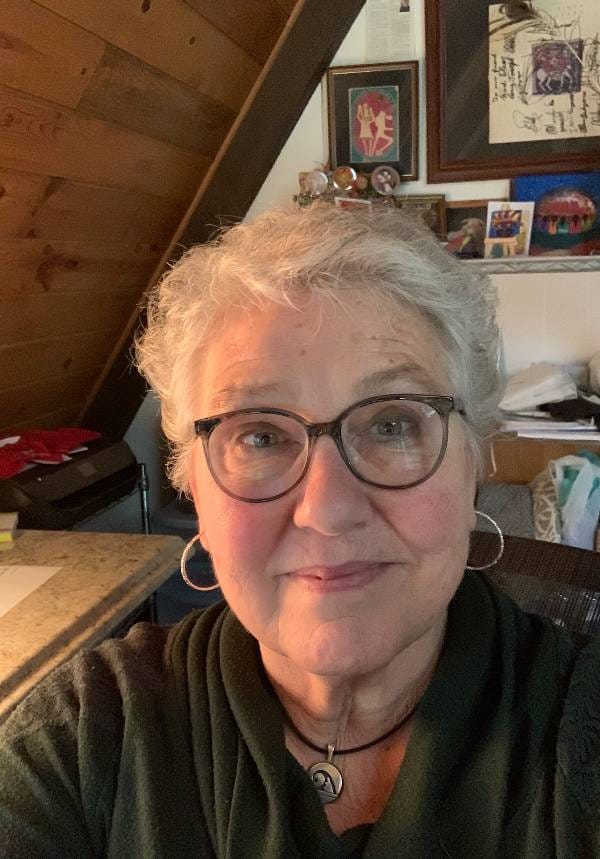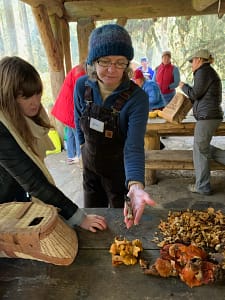
Nancy shared her story in January 2022.
By November 2019, Alice had been cancer-free for six years. She was fit and healthy and just three weeks away from retirement. As a botanist for the U.S. Forest Service, she spent all her days in the woods hiking, wearing out the young whippersnappers that worked there. In her retirement she planned to travel to faraway places to hike and birdwatch.
I had known Alice for 25 years and worked with her at the Forest Service for nearly half that time. We were dear friends and neighbors, our homes just a mile apart out in the country. She was incredibly soft spoken but was fiercely protective of the environment and took immense joy in being outside. Her yard was magnificent — flowers, blooming trees, wild berries and blueberries and raspberries and asparagus growing.

Alice Smith
She went through a lot during her first bout of cancer: chemo, a mastectomy, losing her long braided hair. But by 2019, she was feeling great again, back in the groove of her life, leading tours and hikes around the Sweet Home Ranger District.
That November, she wasn’t feeling sick; she had just led a long guided hike to teach people about mushrooms. But her stomach kept swelling, and she couldn’t figure out why. It turned out that her breast cancer had returned. I took her to Eugene, where her oncologist drained the fluids. Following additional scans, she learned the cancer had spread to her bones. The doctors realized pretty quickly there was no viable treatment option. The cancer had just spread so fast.
Because we lived so close to one another, she’d often come over and we’d have a bonfire in my backyard. Medical aid in dying was a frequent topic of conversation, not just with Alice, but all of my friends in Oregon who are my age. We all voted for the Death with Dignity Act in the 1990s and were big proponents of the option. Alice seemed to always know she would use medical aid in dying when she felt like it was time. She was an independent, single woman. She didn’t want to suffer, and she also didn’t want the people around her to have to watch her suffer.
In mid-January 2020, Alice was admitted to hospice. The hospice workers gave her a frank assessment of what likely lay ahead, including intractable seizures and intense pain — precisely what Alice wanted to avoid. She requested a prescription for aid-in-dying medication and she kept the medication in the box it came in for several weeks. Although she wasn’t sure yet if or when she would need it, just having it gave her comfort and a sense of control over her situation.
Alice was rapidly growing too weak to walk. Then she started having pain and throwing up. In her final months, her sister Lucy came to stay with her. Alice was surrounded by friends telling her goodbye; she began giving her things away, and she stated who she wanted beside her when she died. I saw her on February 11, 2020, the night before she made up her mind. As she was lying in her bed, she told me, “I think tomorrow’s the day.” I said, “Whatever you want to do. You can certainly change your mind. It’s totally up to you.” But she didn’t want to live in pain when she knew she didn’t have to.
Luckily, Alice’s siblings were supportive and so was hospice, which came often to drain the fluid off her stomach. Once Alice made up her mind, we informed them of the plan.
That morning we had a beautiful sunny day, which was so unbelievable for Oregon in February. I brought my zero-gravity chair over to Alice’s backyard. There were five of us: myself, her sister, her brother-in-law, her brother, and another close friend she’d known forever. When I got there, Alice was sitting at her table trying to eat a little bit. And she just looked at me and said, “I’m ready.”
We helped her outside and she got into the chair. Someone had made her a beautiful quilt, and we bundled her up in it. Her backyard was very private, surrounded by woods, with a little pond. We placed bouquets of flowers all around her, so she could lay back in the chair with the sun on her face and see the flowers. Then Alice’s sister Lucy mixed up the medicine with a little apple juice and brought it out. Alice took the cup, and we all reached out to touch her. She drank it, and then she said, “Oh, that’s bitter.” Then she just laid her head down. We all just sat there with our hands on her. It was the most beautiful, peaceful death.
There’s a place in our Forest Service District called Iron Mountain. It has the most species of wildflowers of anywhere in the state of Oregon. Every year, Alice would lead hikes up Iron Mountain to teach people about wildflowers, mushrooms, that sort of thing. She knew I wanted to go up there, but I was in no way physically fit for that kind of steep hike. One day, she was leading a group up the mountain and asked me to come along. She said she’d go slow and she did. I was beyond ecstatic when I made it to the top of the mountain and could look around. It was amazing. From that day on the mountaintop to a February morning in her backyard, Alice helped show me some of the most beautiful things I’ve ever seen.
Mail contributions directly to:
Compassion & Choices Gift Processing Center
PO Box 485
Etna, NH 03750
Compassion & Choices is a 501 C3 organization. Federal tax number: 84-1328829